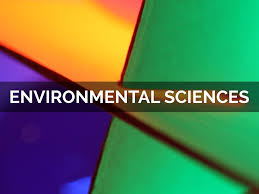Environmental Science
Environmental science is the study of how various elements of the environment combine and prove beneficial or harmful for the environment and the living beings that depend on it for survival. Pollution, global warming, land health, soil degradation, and other issues are among the topics studied. It also allows us to monitor and control the effects of human activity on our environment. Environmental science is a branch of science that deals with the physical and biological aspects of the environment, as well as the solutions to environmental issues. During the Enlightenment, this field arose from natural history and medicine.
Specializations
There is no definite demarcation between the branches of study of Environmental Science, each overlaps on the scope of the other, yet to make things easier to grasp and to facilitate work upon them, the study of Environment Science has been divided into the following divisions:
- Environmental Microbiology is related with the study of microbes and their communities on the environment. It studies the composition and physiology of the microbes.
- Ecology focuses on the examination of living organisms in the natural environment. It is related to the impact of environment on the life, living and survival of various species of animals. Ecology is also sometimes known as environmental biology, and there are a number of sub-disciplines within this branch of the sciences that deal with specific topics of interest, such as the relationship between humans and the natural environment.
- Environmental Chemistry involves the study of the chemical part of Environmental Science and deals with the chemical changes in water, air and soil that are being brought about by the changes in the environment.
- Atmospheric Science as the name suggests is the study of the gaseous layer that covers the earth like a blanket and has a huge role to play in the earth’s environment. This is one branch of Environmental studies that is being worked upon on large scale.
- Environmental Assessment is a branch of study that estimates and assesses the ways and methods to improve and enhance the environment.
What do Environmental Scientists do?
Environmental scientists observe changes in the earth’s atmosphere, study the reasons and try to repair the damages that have been and are being done. They also find how these problems are interrelated to each other.
Environmental Scientists
- Conduct research or perform investigation for the purpose of identifying and eliminating sources of pollutants or hazards that affect either the environment or the health of the population.
- Utilize knowledge of various scientific disciplines and take or suggest actions based on data derived
- Analyze data to determine validity, quality, and scientific significance, and to interpret relationship between human activities and environmental effects.
- Share their scientific and technical information with the public, organizations
- Provide scientific and technical guidance to governmental agencies, environmental programs, industry, or the public.
- Process and review environmental permits, licenses, and related materials.
- Review and implement environmental technical standards, guidelines, policies, and formal regulations that meet all appropriate requirements.
- Investigate and report on accidents affecting the environment.
- Research sources of pollution to determine their effects on the environment and to develop theories or methods of pollution control
Scope of Environmental Science in Pakistan
In Pakistan, the scope of environmental science is expanding continuously. After attaining a bachelor’s degree in Environmental science, Environmentalists seek to recognize problems with our environment around the world. They also work to discover answers to these issues. They work for the restoration and protection of natural resources and biodiversity in government or private organizations. Students with graduation in environmental science can excel in a large number of disciplines depending on their area of interest.
How to become an environmental scientist
For most entry-level jobs, a bachelor’s degree in environmental science or a science-related field, such as biology, chemistry, physics, geosciences, or engineering is required. However, a master’s degree may be needed for advancement with specializations such as Environmental Management, Energy and Air Pollution Control, Conservation, Environmental Law, and Policy. A Doctorate degree is essential for research and academic jobs.
Top universities for Environmental Sciences
- University Of The Punjab, Lahore
- Quaid-e-Azam University, Islamabad
- University Of Agriculture, Faisalabad
- International Islamic University, Islamabad
- Bahria University, Islamabad
- Bahaudin Zakariya University, Multan
- University of Peshawar, Peshawar
- COMSATS University Islamabad,
- National University of Sciences and Technology, Islamabad
Undergraduate Degree Programs in Environmental Sciences
Environmental Sciences Job Market
- Government Departments
- Agricultural Firms
- Forest Service
- Construction and engineering companies
- Environmental protection NGOs
- Environmental welfare organizations
- Teaching in colleges and universities
- Water supply and treatment plants
- Testing laboratories
- Consulting firms
- Scientific research departments
- Social Development Sector
- Solid Waste Management Companies
- Health Department
Qualities Required
- Scientific aptitude
- A strong background in biology and Chemistry
- Paying Attention to Detail
- Analytical & Critical Thinking
- Observation
- Persistence
- Cooperation
Views: 65614






